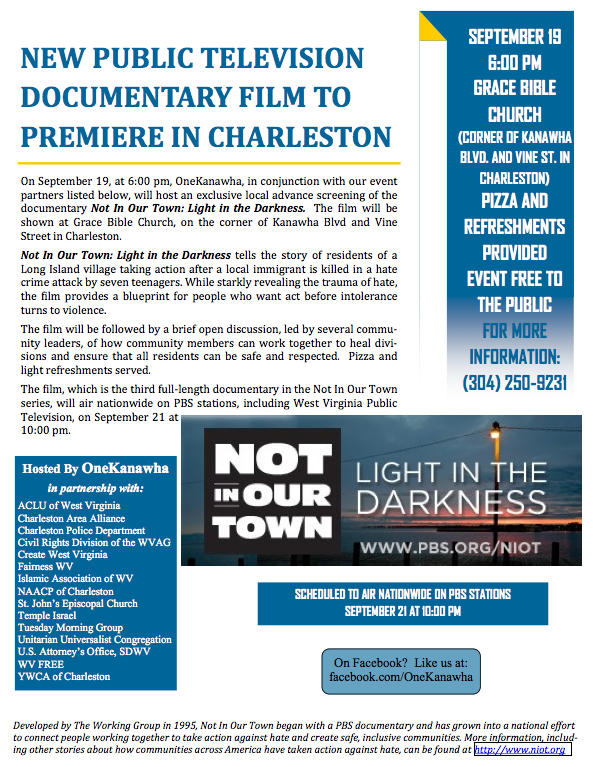 There is a moment in the documentary, Light in the Darkness, that has lingered with West Virginia resident Paul Sheridan.
There is a moment in the documentary, Light in the Darkness, that has lingered with West Virginia resident Paul Sheridan.
In the film, Patchogue, N.Y. mayor Paul Pontieri returns to the intersection where Ecuadorian immigrant Marcelo Lucero was murdered. Pontieri meets a man, he discovers, who has been a neighbor to Pontieri’s family for 25 years.
“I didn’t know who he was,” Pontieri says. “Do they make themselves invisible, or do we make them invisible by not seeing them?”
It’s a relevant question for many communities with changing demographics. Sheridan, a community leader who cares about safety and inclusion, asks, “What are the communities that we are blind to? That’s the question that hangs in the air a little bit, and we haven’t really thought through how we’re reaching out.”
Sheridan is a member of One Kanawha, whose mission is to increase dialogue and understanding of diversity. Though Charleston is a welcoming city and home to a growing Latino population, West Virginia is the most homogeneous state on the East Coast.
Over the years, Sheridan has screened the original Not In Our Town story based in Billings, Montana nearly 100 times to people interested in community responses to intolerance. The release of Light in the Darkness, he says, is another opportunity to rekindle the conversation.
One Kanawha is teaming up with an impressive array of groups for its Sept. 19 screening: ACLU of West Virginia, Charleston Police Department, Islamic Association of West Virginia, NAACP of Charleston, St. Episcopal Church, Temple Israel, the U.S. Attorney’s Office, YWCA of Charleston and more.
.jpg) Several days later, on Sept. 26, the film will screen at the private liberal arts college, University of Charleston. The entire freshman class—comprised of 350 students—is required to attend. The event is also open to the public.
Several days later, on Sept. 26, the film will screen at the private liberal arts college, University of Charleston. The entire freshman class—comprised of 350 students—is required to attend. The event is also open to the public.
University professor Hallie Chillag Dunlap believes her students will face cultural clashes that extend beyond racism, whether it be judgments on socio-economic status or sexuality.
“We really want to empower our students to think about these issues in a way that’s very positive,” Chillag Dunlap said. “We’re just looking for tools to help our students see this as an opportunity, so when they see issues of intolerance, they can stand up for each other.”
Following the Sept. 26 screening, students will discuss the film in small groups and Chillag Dunlap hopes to integrate these discussions throughout their education.
The university screened the original Not In Our Town in the spring and invited community leaders to discuss the film with students in classrooms. Though the students related to the first film, she’s excited about the conversation possibilities of Light in the Darkness, as it features students close to their age.
Visit OneKanawha's Facebook page here. Read about how West Virginia turned hate into an opportunity for community building and Paul Sheridan's article, "Not In Our Town as a Tool for Law Enforcement."
For more information on the film, visit the Light in the Darkness page. You can also find a screening near you or host one in your town. Not In Our Town offers numerous resources to help make your screening successful.